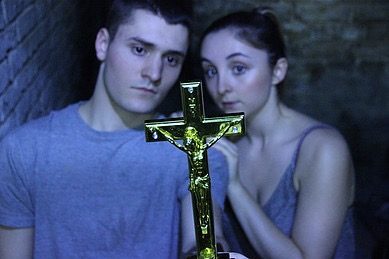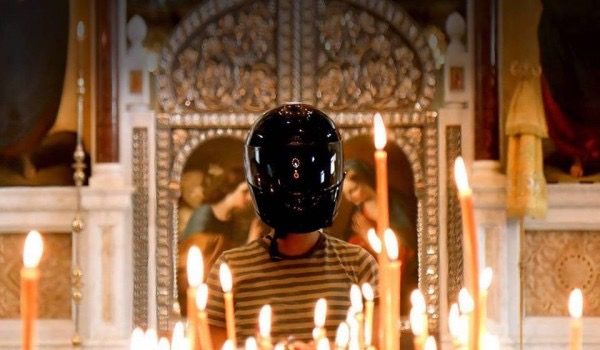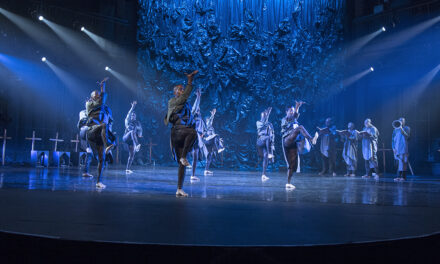“How many children dream of being Jesus!?” This question echoes throughout Maria Manolescu’s I’m Not Jesus Christ, and we all learn in this blackly comic tale that the answer is a contradictory one. Written by Maria Manolescu in 2007, I’m Not Jesus Christ showcases both British and Romanian actors, with a pleasing mixture of accents and characters, and creates a little bit of Romania in the South of London. With so many theatres in the capital currently spewing out the words of Shakespeare, Theatre N16 gives us a break from it all, even if you need to go all the way to Balham to find it.
Mihai, the central character (Andrei Costin) really should go to school. The 11-year old boy can barely read, doesn’t know anything about the world and brings home prostitute Ana (Sharon Duffy) for his birthday. And this unleashes hell, or at least 7000 devils–as his mother Maria (Izabella Urbanowicz) yammers, soundly believing Mihai to be the Second Coming. But there aren’t any miracles in I’m Not Jesus Christ, just a steadily building chaos as another prostitute arrives (Maria Alexe), bringing corruption and a television-cameraman along with her. Nobody listens to Mihai–who’d rather be Michael Schumacher than ‘quote nicely from the Bible’ or embody the Messiah that the swelling number of people around him demand. His voice can only be heard in surreally-lit interludes when his thoughts break through the buzzing of the adults around him. Thanks to this, we learn about the past and how the “Lordy Lord” led his mother to raise him to be Christ.
I’m Not Jesus Christ spares no one, and is laudably direct and punchy. With only four actors, it lines up a whole range of issues from violence to love that haven’t changed since Christ was crucified. The simple yet cleverly arranged setting nicely suggests that, no matter how the modern world and its possessions constantly tempt us, religion still plays a central role in Romanian life. The ever-changing lighting guides us beautifully between warmly colored reality and the halogen-cool moments of Mihai’s mind. His story might be hard to believe, even if the play is partly based–as the publicity claims–on real-life events. But the dark Transylvanian forests can doubtless shut people off from the outside world–and Izabella Urbanowicz, playing the faithful mother, delivers this distinctive Romanian reality without a hitch. Torn between her twisted love towards her son and her religious illusions, Izabella shows us how, having been discarded by society, one fairly craves acceptance and approval.

As we watch the other characters making repeated demands for miracles from Mihai, the parallels I’m Not Jesus Christ draws between the life of (the real) Jesus Christ and the tragedy of an 11-year-old boy become increasingly clear–but somehow the message gets lost along the way. Few people are prudish in 2016–especially in London–yet the opening scene, as Mihai lures home a prostitute with the promise of a cake, left the audience askance for at least 15 minutes. Andrei Costin manages to bring out the innocence of Mihai, but at times is less than completely convincing as an 11-year-old child. Unfortunately too, I’m Not Jesus Christ hasn’t been updated since 2007 in terms of its references to Michael Schumacher, which might seem a shortcoming to some. More importantly, though, we never learn why Schumacher–a figure particularly dear to the region, incidentally–plays such an important role in Mihai’s (or Romanian) life. Those unfamiliar with Eastern European culture may be mystified.
Yet without a doubt, once you put yourself into the hands of the cast, the play holds your attention till the very end. Probing the limits of love and sacrifice, it manages to take you to the darkest social reaches amidst the mountains of Romania, even if not always with a firm hand. I’m Not Jesus Christ gives us the dark tale of a boy who may not be Jesus, but may yet have a shot at being the Michael Schumacher of telling stories.
This article originally appeared in Central and Eastern European London Review on May 16th, 2016 and has been reposted with permission.
This post was written by the author in their personal capacity.The opinions expressed in this article are the author’s own and do not reflect the view of The Theatre Times, their staff or collaborators.
This post was written by Kata Karah.
The views expressed here belong to the author and do not necessarily reflect our views and opinions.


















